Refusing a breathalyzer test during a traffic stop triggers automatic consequences due to implied consent laws. A person's license can be immediately suspended for a period that varies by state, accompanied by fines. This refusal may also serve as evidence of guilt in court, complicating a defense strategy. Alternative tests could still determine blood alcohol content, and repeated refusals result in harsher penalties. With additional insights, uncover more about dealing with such situations.
Key Takeaways
- Refusing a breathalyzer results in automatic license suspension, varying by state, often ranging from 270 days to one year.
- Refusal can be used as evidence of guilt in court, suggesting the driver knew they were impaired.
- Penalties for refusal include fines, mandatory alcohol education, and potentially an ignition interlock device upon license reinstatement.
- Law enforcement may obtain a warrant for a blood test if a breath test is refused.
- Repeat refusals lead to cumulative penalties, including longer license suspensions and higher fines.
Understanding Implied Consent Laws
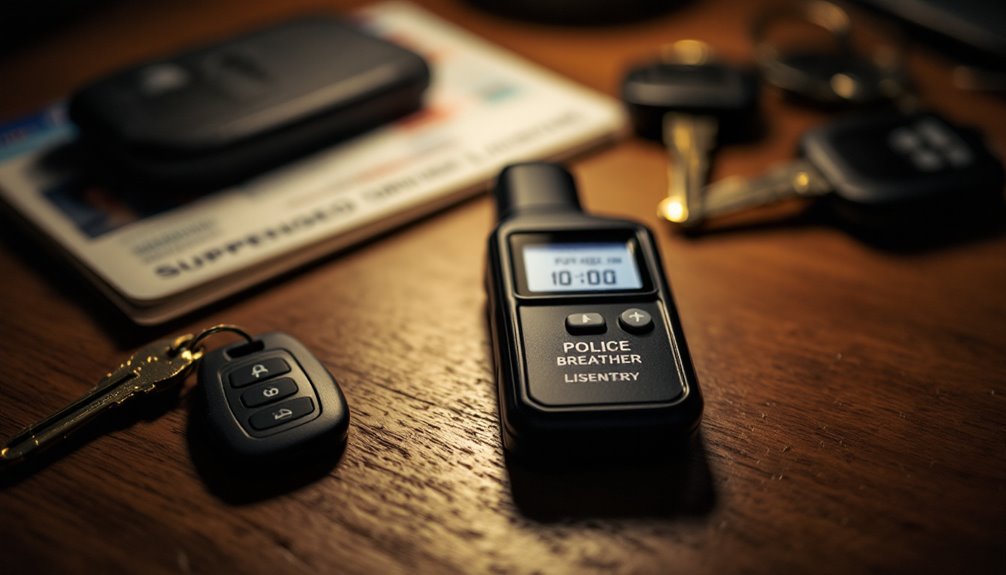
Implied consent laws are essential in understanding the obligations of drivers. These laws exist in all 50 states and the District of Columbia. By holding a driver’s license, individuals agree to chemical tests to check blood-alcohol content. This includes breath, blood, or urine tests. The idea is that driving is a privilege, not a right. If a driver refuses these tests, they face refusal penalties. This can lead to license suspension. Even if a driver refuses, it does not mean they will avoid DUI charges. Other evidence, like field sobriety tests, can still be used in court. Refusal may result in fines and mandatory education programs. Repeat offenders face harsher penalties. Compliance with these laws is vital for all drivers. Each state may have specific regulations regarding implied consent, but the fundamental principle remains the same: drivers must comply with requests for testing when suspected of driving under the influence. For example, implied consent laws in California outline strict consequences for those who choose to refuse testing, including automatic license suspension and enhanced penalties for subsequent offenses. Ultimately, understanding these laws helps ensure safer driving conditions for everyone on the road.
Immediate Administrative Penalties
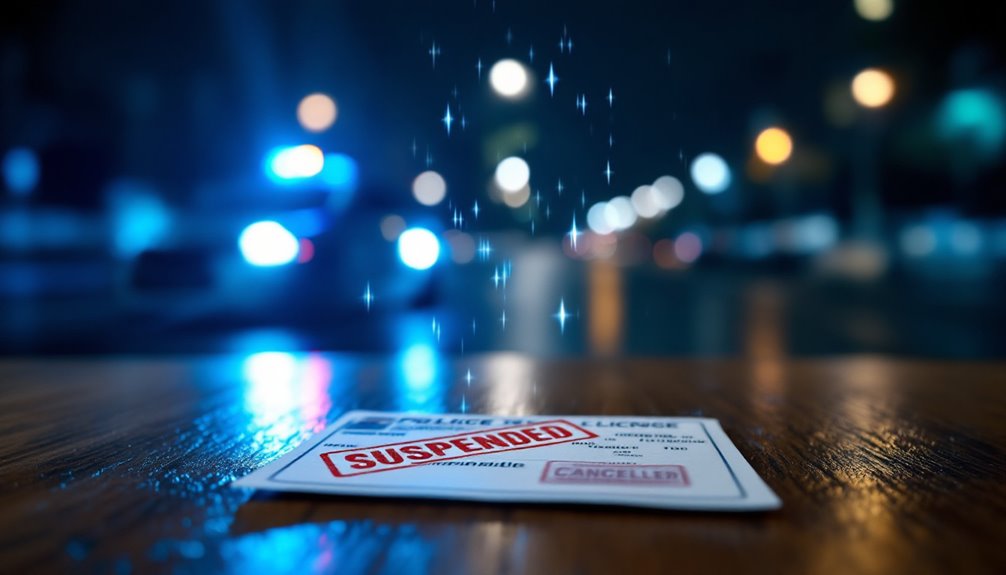
Upon refusing a breathalyzer test, drivers face immediate administrative penalties. One major consequence is the automatic suspension of their driver's license. The duration of the suspension varies by state. For example, it is six months in Ohio and can be up to a year in Washington and Tennessee for first-time offenders. These penalties are separate from criminal charges and are imposed quickly, often without a court hearing. They may include fines and mandatory alcohol education programs. Repeat offenders might face increased penalties. Additionally, an ignition interlock device may be required upon license reinstatement. Refusal impacts driving privileges long-term and complicates legal proceedings. Understanding these penalties is vital in forming a criminal defense strategy.
Legal Consequences of Refusal

Refusing a breathalyzer test can lead to serious legal consequences. A major risk involves license suspension, which can be longer than for a DUI conviction. In court, refusal may be seen as guilt, though alternative testing options like blood tests might still be available.
License Suspension Risks
Rejecting a breathalyzer test can lead to immediate consequences for a driver's license. A refusal triggers an automatic license suspension, separate from any court decision. Drivers have legal rights, similar to Miranda rights, but refusing affects these rights. The suspension period varies:
- First Arrest: Results in a one-year suspension with no driving privileges.
- Second Arrest: Leads to a two-year suspension.
- Third Arrest: Results in a three-year suspension.
A DMV hearing allows a driver to contest the suspension. Arguments can be made about the legality of the stop or failure to inform about consequences. Winning this hearing may reinstate driving privileges. However, the suspension is often longer than for a DUI without refusal.
Courtroom Implications
Traversing the legal landscape of a breathalyzer refusal extends beyond license suspension risks. In court, refusal as evidence can suggest a driver's consciousness of guilt. This perception negatively impacts the defense. Prosecutors might argue the refusal indicates knowledge of being over the legal limit. Such evidence can lead to enhanced penalties, including increased fines and longer jail sentences. Courts may impose mandatory alcohol education or require ignition interlock devices. Refusal also limits the defense's ability to challenge BAC results. Without breath test data, attorneys must rely on other strategies. They might question the test administration or argue misunderstanding of refusal consequences. However, refusal can still result in DUI charges based on other evidence, like field sobriety tests.
Alternative Testing Options
When a driver refuses a breathalyzer test, law enforcement can pursue alternative methods like a blood test. A blood test is often more accurate and can be done with a warrant. Refusal carries legal consequences because of implied consent laws. These laws state that by driving, one agrees to BAC testing. Here's what happens:
- License Suspension: Immediate suspension for refusing a test, often lasting a year for the first offense.
- Financial Penalties: Fines may increase, reaching up to $500 for a first refusal, and more for repeat offenses.
- Mandatory Education: Drivers may have to attend alcohol education programs.
Refusal does not stop law enforcement from getting evidence through a blood test, impacting legal outcomes.
Impact on Criminal Proceedings
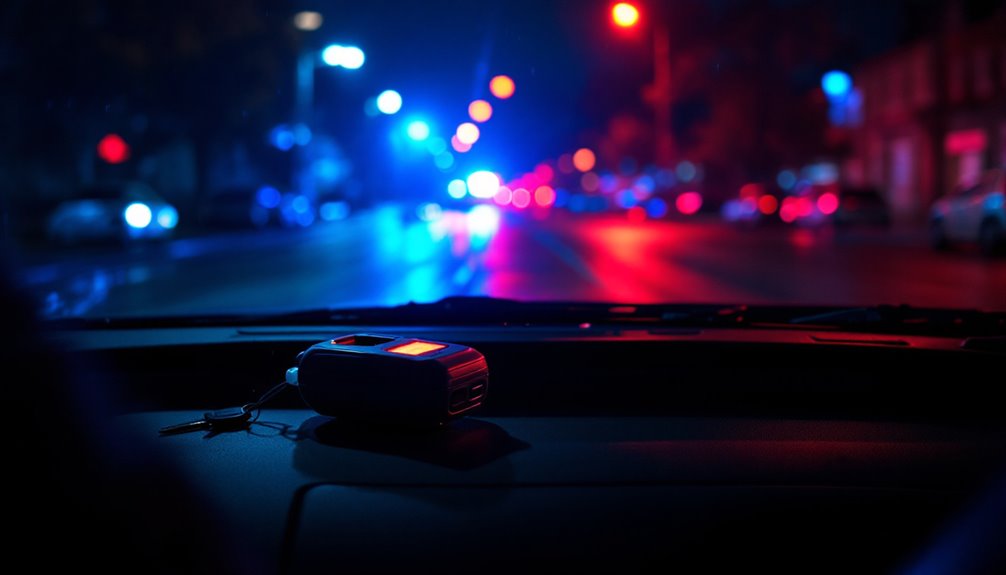
Refusing a breathalyzer test can be used as evidence of guilt in court. This refusal often leads to increased penalties, such as longer license suspensions and higher fines. Prosecutors may argue that the refusal shows the individual was aware of their intoxication.
Evidence of Guilt
Refusal to take a breathalyzer test can substantially impact criminal proceedings. It can be used as evidence of guilt, affecting the criminal implications for the accused. Prosecutors often argue that refusal indicates the individual was aware of their impairment. This makes defending against DUI charges challenging.
- In Illinois, refusal can be combined with video, audio, driving behavior, and witness testimony. This strengthens the prosecution's case.
- In Florida, the refusal suggests consciousness of guilt. Prosecutors use it alongside field sobriety tests and officer observations.
- In Court Proceedings, refusal is admissible as evidence. It can sway jury perception, complicating the defense strategy.
Without breathalyzer results, the defense must rely on other evidence, making the defense strategy more complex.
Increased Penalties
Facing increased penalties is a significant consequence of refusing a breathalyzer test. License suspension can happen immediately. In Massachusetts, a first-time refusal leads to a 180-day suspension. Other states impose suspensions from 6 months to a year. Fines for refusing range from a few hundred to several thousand dollars. These penalties occur even without a DUI conviction. For repeated refusals, the consequences grow. In Massachusetts, a second refusal can mean a three-year suspension. A third refusal might result in a lifetime suspension. Enhanced penalties include stricter fines and longer suspension periods. Each refusal adds cumulative penalties. Such penalties affect driving privileges and daily life, making it hard to work or meet responsibilities.
Alternative Chemical Testing Methods
When considering alternative chemical testing methods for determining blood alcohol concentration (BAC), one might look at blood tests and urinalysis. These tests offer different ways to measure alcohol levels when someone refuses a breathalyzer. Refusal to submit to a chemical test can lead to penalties like license suspension under implied consent laws. Here are some points about alternative tests:
- Blood Tests: They are accurate but costly and complex. They measure alcohol directly in the bloodstream.
- Urinalysis: This method is less direct, often slower, and needs lab verification.
- Breath Analysis: It is common due to its quick results, though it requires proper device maintenance.
These methods help guarantee accurate BAC readings in various situations.
Legal Defenses Against Refusal Charges
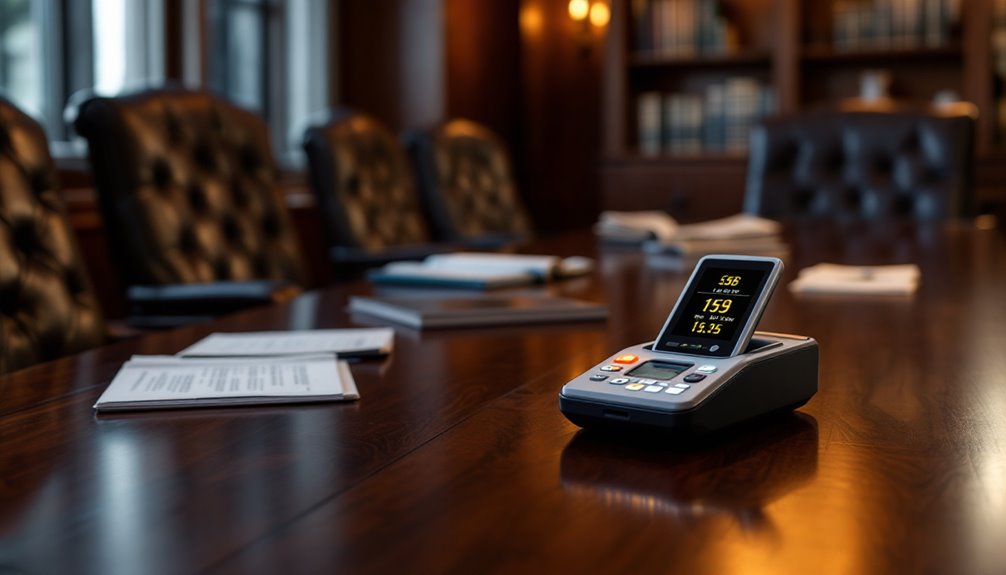
Although refusing a breathalyzer test can lead to serious legal consequences, there are several defenses available to challenge these charges. The first legal defense involves arguing lack of probable cause. An officer must have a valid reason to believe someone was driving under the influence. If the traffic stop was unlawful, refusal charges might be dismissed. Another defense is demonstrating improper consent warning. Officers must clearly state the consequences of refusing. If they fail, the charges can be invalidated. Confusion or misleading actions by the officer also serve as a defense. If warnings are unclear or given poorly, it can challenge the charges. Finally, medical conditions preventing a breath test may provide a valid legal defense.
Navigating License Suspension Hearings
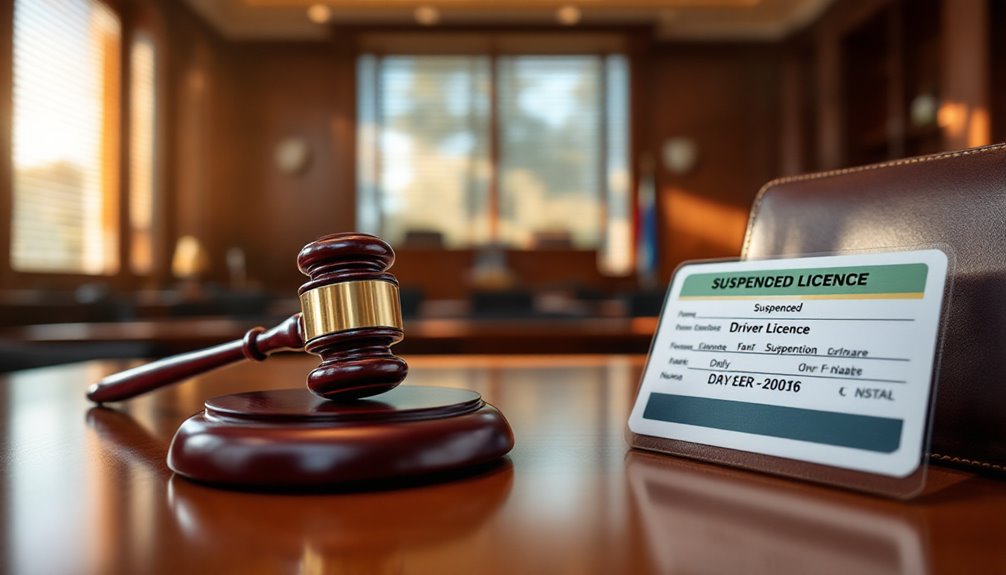
When facing a license suspension hearing, it is essential to request the hearing promptly within the specified timeframe. Presenting a strong defense involves gathering evidence and preparing to explain the circumstances. Having legal representation can substantially impact the outcome, providing guidance and support throughout the process.
Requesting a Hearing
Requesting a hearing is an essential step for anyone facing a license suspension after refusing a breathalyzer test. It is critical to follow the process correctly to have a chance at contesting the suspension. Here's what you need to know:
- Eligibility: You must request a hearing within 15 days of the suspension notice. Missing this deadline means automatic suspension.
- Process: The request has to be in writing and sent to the correct department, like the DMV. Legal advice can guarantee proper steps are taken.
- Focus: The hearing only addresses the suspension, not the criminal DUI charge. It's separate from court proceedings.
Understanding these steps can help navigate the system effectively.
Presenting Your Defense
To effectively present a defense in a license suspension hearing, understanding the process and strategy is essential. The driver must focus on evidence presentation and procedure challenges. They can gather evidence to support their case, such as inconsistencies in the officer's statement or issues with the chemical test procedure. During the hearing, the driver has the opportunity to challenge the evidence presented by the state. The arresting officer will testify, and this is a chance for cross-examination. The burden of proof may lie with the officer to prove the lawfulness of the arrest and the accuracy of the test, or with the driver to demonstrate any impropriety. Properly addressing these elements is vital for a strong defense.
Legal Representation Importance
Presenting a defense effectively requires more than just understanding the process; it often necessitates skilled legal representation. A DUI attorney plays a critical role in handling the complexities of license suspension hearings. They guarantee hearing scheduling is timely and assist in building a strong case by examining probable cause.
- Scheduling Expertise: Legal representation guarantees the hearing is scheduled within the required 30-day timeframe, essential for avoiding suspension.
- Probable Cause Review: Attorneys scrutinize whether officers had justifiable reasons for the stop, impacting the hearing's outcome.
- Evidence and Witnesses: A lawyer manages evidence presentation and witness subpoenas, essential for a fair hearing.
With professional guidance, one can better protect their driving privileges and rights.
The Role of Law Enforcement in Testing Refusal
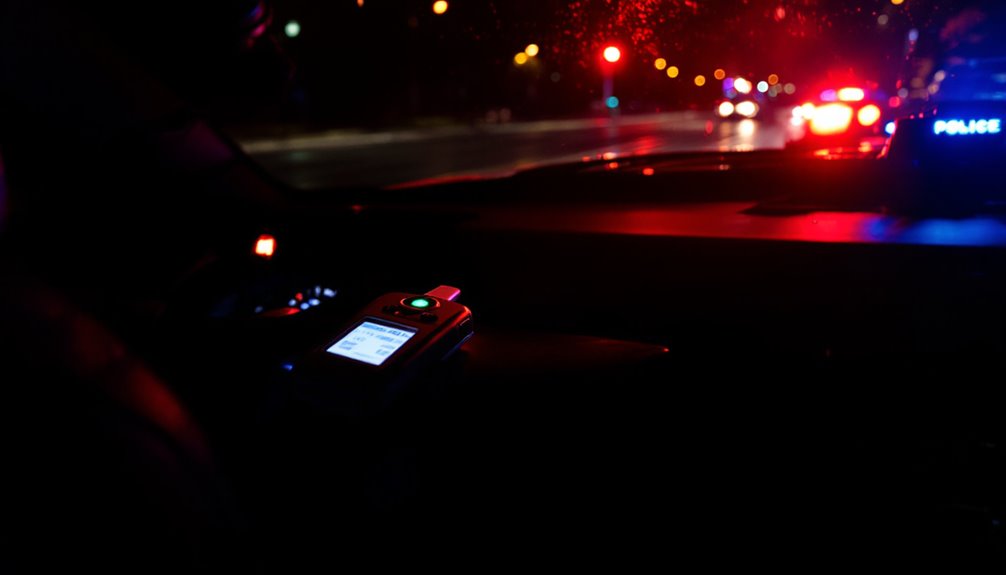
When law enforcement suspects a driver of operating under the influence, they can ask the driver to take a breathalyzer test. Under implied consent laws, drivers agree to this testing when they get their licenses. Refusing has serious refusal consequences. The officer must tell the driver about these, including the risk of license suspension. Even without a breathalyzer, the refusal can be used as evidence. Officers may secure a search warrant for a blood test. A refusal can lead to an automatic administrative suspension of the driver's license. Other evidence, like field sobriety tests, can also be used. Law enforcement's role is vital in gathering evidence and informing drivers of the implications of their choices.
Long-Term Implications for Repeat Offenders
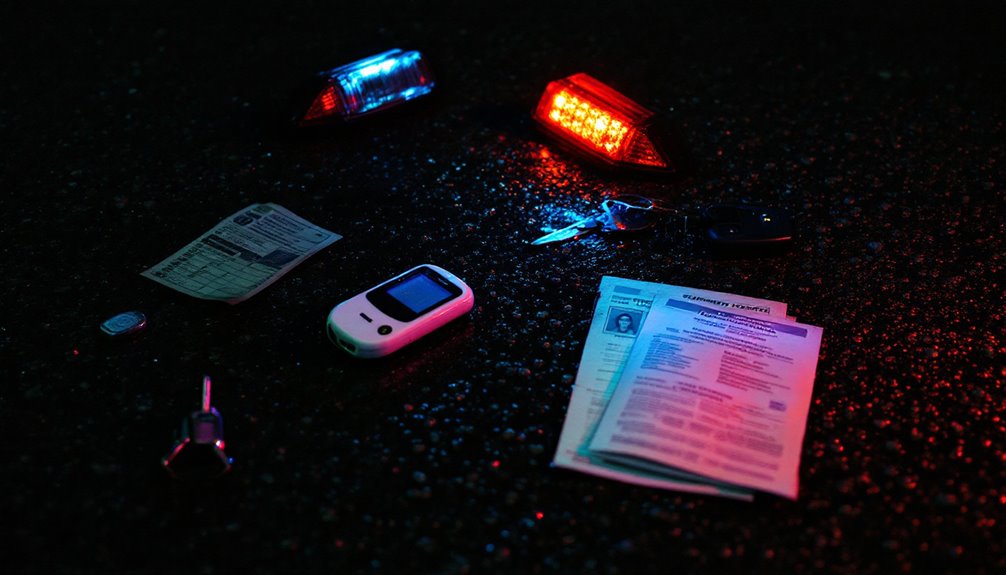
Repeat offenders face significant long-term consequences after refusing a breathalyzer test. The refusal leads to harsh outcomes, which can be severe and lasting. There are several key implications:
- Automatic License Suspension: With each refusal, the suspension period grows. A first refusal might mean one year off the road, but repeated refusals can extend this to three years or more.
- Increased Penalties: Fines increase with each offense. For example, a second refusal in New Jersey may result in a $1,000 fine.
- Mandatory Jail Time: Some states impose jail sentences for multiple refusals, which can result in significant time behind bars.
These consequences disrupt life, affecting both driving privileges and financial stability.
Seeking Legal Assistance and Representation

In seeking legal assistance and representation after refusing a breathalyzer test, understanding the role of a DWI defense attorney is essential. A DWI defense attorney helps navigate the criminal justice system. They can challenge the legality of the traffic stop and refusal. If the police lacked probable cause or failed to inform the driver of consequences, the attorney can suppress evidence. Legal representation is critical in examining police procedures and constitutional violations. The attorney evaluates evidence, such as police reports and officer testimony. They might negotiate plea bargains to reduce penalties. By presenting valid defenses, like language barriers or medical conditions, the attorney strengthens the case. Legal representation guarantees the driver's rights are protected and offers the best defense strategy.
Frequently Asked Questions
Can Refusal Affect Insurance Rates or Coverage?
Refusal can impact insurance rates and coverage. Insurers may see refusal as risky, leading to higher premiums. Rates can double and remain elevated for years. Some companies might even cancel policies. Finding new coverage can be hard, with high costs when possible. Refusal marks affect future insurance applications, causing potential denial or high rates. The financial burden from increased premiums can extend over a long period, affecting budgeting and savings.
Are There Any States Without Implied Consent Laws?
The idea of a state without implied consent laws is like a ship without a rudder, drifting aimlessly. In the United States, all 50 states have implemented implied consent laws. This means every driver on the road has agreed to BAC testing if suspected of driving under the influence. These laws are essential for maintaining order and safety, ensuring drivers face consequences if they refuse such tests. Without these laws, law enforcement would struggle to hold impaired drivers accountable, leading to greater risks on the road. Similar to how the Miranda warning in the Bay Area protects individuals’ rights during an arrest, implied consent laws help uphold public safety by discouraging intoxicated driving. These regulations serve as a crucial deterrent, reinforcing responsible behavior among motorists.
How Do International Drivers Face Breathalyzer Refusal?
International drivers face different rules for breathalyzer refusal depending on the country. In Canada, refusal can lead to license suspension and criminal charges. In California, USA, a driver's license can be suspended for one year, and refusal may be used as evidence of guilt. Generally, refusal often results in severe penalties, including fines, jail time, and mandatory classes. Drivers should understand local laws and seek legal advice if needed.
What Are the Psychological Effects of Facing DUI Charges?
Facing DUI charges can feel like the end of the world. Individuals often experience overwhelming shame and guilt. Anxiety skyrockets due to potential legal penalties. Relationships suffer, with trust becoming a fragile thread. Social stigma adds to feelings of isolation. Anxiety and depression can take root, making daily life difficult. The emotional impact is profound, sometimes leading to long-term mental health issues. Support systems become essential for coping with this challenging time.
Can Refusing a Breathalyzer Impact Employment Opportunities?
Refusing a breathalyzer can affect employment. It may lead to license suspension, making commuting difficult. Job loss is possible, especially in roles needing driving. Employers may see the refusal as unreliable behavior. Background checks can reveal refusals, impacting job applications. It can damage professional reputation and limit career growth. Insurance costs may rise, adding financial strain. Overall, it can substantially hinder job opportunities and long-term career prospects.
Conclusion
Coincidentally, refusing a breathalyzer test often leads to unintended consequences. While some might think refusal dodges trouble, it can actually bring more complications. Losing driving privileges, facing fines, or even criminal charges are possible. It's ironic how trying to avoid one problem can create several others. Understanding the laws and seeking legal help can make a difference. In the end, knowing the legal landscape can help individuals make informed decisions in difficult situations.
